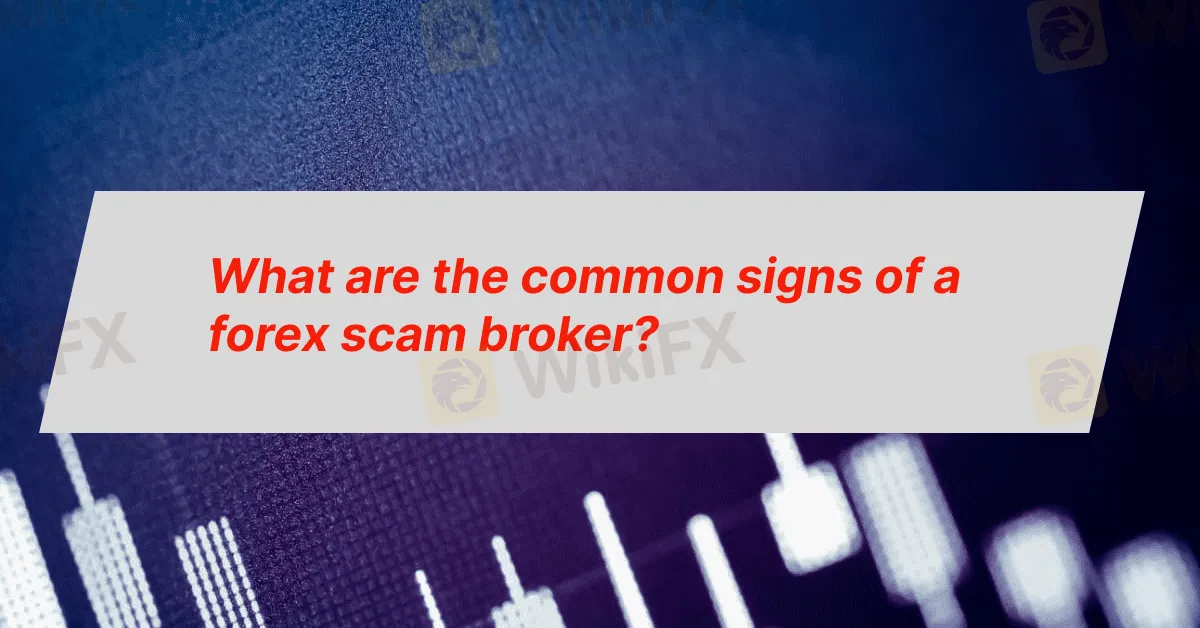简体中文
繁體中文
English
Pусский
日本語
ภาษาไทย
Tiếng Việt
Bahasa Indonesia
Español
हिन्दी
Filippiiniläinen
Français
Deutsch
Português
Türkçe
한국어
العربية
What are the common signs of a forex scam broker?
Abstract:The forex market, with its daily trading volume exceeding $7.5 trillion, offers vast opportunities for traders. However, this immense market also attracts fraudulent brokers aiming to exploit unsuspecting investors. Recognizing the signs of a scam broker is crucial to safeguarding your capital and ensuring a secure trading experience.

Introduction
The forex market, with its daily trading volume exceeding $7.5 trillion, offers vast opportunities for traders. However, this immense market also attracts fraudulent brokers aiming to exploit unsuspecting investors. Recognizing the signs of a scam broker is crucial to safeguarding your capital and ensuring a secure trading experience.
Common Signs of a Forex Scam Broker
1. Unrealistic Promises of High Returns
Be wary of brokers guaranteeing high returns with little to no risk. Such promises are classic red flags of a scam. Forex trading involves significant risks, and no legitimate broker can assure consistent profits.
2. Lack of Regulation
Legitimate forex brokers are regulated by reputable authorities such as the U.S. Commodity Futures Trading Commission (CFTC), the U.K. Financial Conduct Authority (FCA), or the Australian Securities and Investments Commission (ASIC). Unregulated brokers often operate from offshore jurisdictions with minimal oversight, increasing the risk of fraudulent activities.
3. High-Pressure Sales Tactics
Scammers often use aggressive sales tactics to pressure traders into making quick decisions. They may claim that an offer is available for a limited time or that you must act immediately to secure a special deal. Legitimate brokers provide clear and transparent information without applying undue pressure.
4. Difficulties with Withdrawals
A common tactic among scam brokers is to delay or deny withdrawal requests. If you encounter obstacles when trying to withdraw your funds, it's a strong indication of fraudulent practices.
5. Unclear or Misleading Information
Scam brokers often provide vague or misleading information about their services, fees, and trading conditions. They may lack transparency regarding their business operations or fail to provide clear contact details. Legitimate brokers offer comprehensive information and are transparent about their services.
Steps to Protect Yourself from Forex Scams
1. Verify Broker Regulation
Before engaging with a broker, confirm their regulatory status by checking with recognized authorities. Regulated brokers are required to adhere to strict standards, providing a layer of protection for traders.
2. Conduct Thorough Research
Investigate the broker's background, read reviews from other traders, and search for any regulatory actions or complaints. A lack of transparency or negative feedback can be warning signs.
3. Test with a Demo Account
Most reputable brokers offer demo accounts that allow you to practice trading without risking real money. Use this opportunity to assess the broker's platform and services.
4. Be Cautious with Unsolicited Offers
Avoid brokers that contact you unsolicited through phone calls, emails, or social media messages. Legitimate brokers do not engage in aggressive marketing tactics.
5. Monitor Your Account Regularly
Keep a close eye on your trading account for any unauthorized transactions or suspicious activities. Promptly report any discrepancies to the broker and regulatory authorities.
Conclusion
While the forex market offers lucrative opportunities, it's essential to remain vigilant against potential scams. By recognizing the warning signs and taking proactive measures, you can protect your investments and engage in a secure trading experience.

Disclaimer:
The views in this article only represent the author's personal views, and do not constitute investment advice on this platform. This platform does not guarantee the accuracy, completeness and timeliness of the information in the article, and will not be liable for any loss caused by the use of or reliance on the information in the article.
Read more

IronFX vs Tickmill: A Detailed Comparison for 2025
Discover an in-depth comparison between IronFX and Tickmill, covering regulations, account types, features, and recent cases to guide your trading choices.

OctaFX and XM Trading Platforms to Be Blocked in Singapore
OctaFX and XM will be blocked in Singapore for offering unlicensed trading services, breaching local regulations. Access will be restricted from June 2025.

ATFX Opens New Office in Cape Town's Portside Tower to Expand in Africa
ATFX inaugurates a new office in Cape Town, marking a key milestone in its African expansion, with dedicated teams to enhance local trading services.

Interactive Brokers Expands with Euronext Mini Stock Options
Interactive Brokers adds Euronext mini stock options for European investors, offering new hedging opportunities and smaller contract sizes for higher-priced stocks.
WikiFX Broker
Latest News
IronFX Broker Review 2025: A Comprehensive Analysis of Trustworthiness and Performance
OctaFX Flagged by Malaysian Authorities
Nonfarm Data Lifts Market Sentiment, U.S. Stocks Rebound Strongly
Interactive Brokers Enhances PortfolioAnalyst with New Features
Tighter Scrutiny: Finfluencers Face Global Crackdown Amid Rising Risks
ATFX Opens New Office in Cape Town's Portside Tower to Expand in Africa
OctaFX and XM Trading Platforms to Be Blocked in Singapore
Why Your Worst Enemy in Trading Might Be You
Errante Broker Review
Currency Hedging Practices and How They Protect Traders' Interests
Currency Calculator


